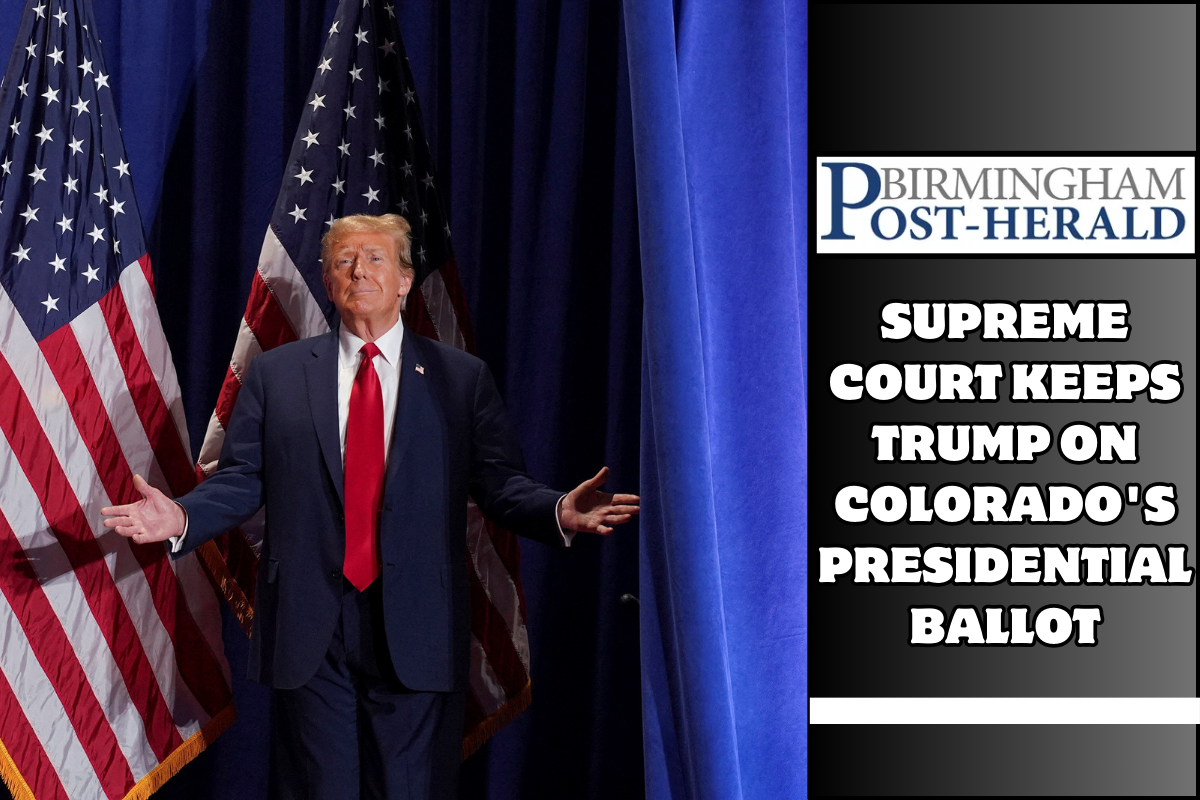Supreme Court keeps Trump on Colorado’s presidential ballot:-Thursday, the U.S. Supreme Court will hear Donald Trump’s appeal of a Colorado decision that kept him off the ticket for the presidential primary because he was involved in the riots at the U.S. Capitol on January 6, 2021.
Supreme Court keeps Trump on Colorado’s presidential ballot
In a 4–3 vote in December, the Colorado Supreme Court said that Trump can’t run because of Section 3 of the 14th Amendment. The part from after the Civil War says that someone who has “engaged in insurrection” cannot take office again.
Across the country, similar lawsuits against Trump’s candidature have been made, and Maine’s Democratic secretary of state has said that he can’t be on the ballot.
If the justices don’t agree with Trump’s arguments and uphold Colorado’s decision, other states could do the same and take him off the ballot as well. This could have huge effects on this year’s presidential race.
Here is what you need to know about the part of the Constitution that will be at the centre of the arguments.
What is the 14th Amendment?
After the Civil War, the 14th Amendment to the U.S. Constitution was passed to give people who had been slaves access to the rights in the Bill of Rights. Congress passed it in June 1866, and it became law in July 1868.
It also gave people in each state the right to due process.
The U.S. Supreme Court’s decision to overturn Roe v. Wade in 2013 brought the 14th Amendment into the public eye. The 14th Amendment’s due process section has been used to protect the right to privacy, which was a key point in the 1973 Roe v. Wade decision that helped protect the right to have an abortion.
14th Amendment, Section 3 full text: What does it say about insurrection?
Section 3 of the 14th Amendment is where the argument about Trump’s possible role in the riots in the Capitol on January 6 takes place.
Section 3 states:
- No one who took an oath as a member of Congress, an officer of the United States, a member of any State legislature, or an executive or judicial officer of any State to support the Constitution of the United States shall be a Senator, Representative, or elector of President and Vice President, or hold any civil or military office under the United States or any State. They must also not have been involved in an insurrection or rebellion after taking the oath. But with a vote of two-thirds of each House, Congress can get rid of that.
In sumarry, it says that someone who has been insurrectionary after swearing to support the constitution (for example, when they were sworn into office) cannot hold office again.

Also Read:-Nikki Haley notches first win in bid for GOP presidential nomination, upsets Trump in DC primary
14th Amendment, Section 3 and Trump’s 2024 presidential run
A lot of lawsuits across the country used Section 3 of the 14th Amendment to say that Trump can’t be president again. Colorado’s lawsuit was one of them.
As opposed to “Senator or Representative in Congress” in Section 3, which does talk about the office of the president, his lawyers say it was never meant to apply to that job.
Lawyers for the lawsuit and watchdog group Citizens for Responsibility and Ethics in Washington have said that Trump’s actions to change the results of the 2020 election, including his role in the attack on the U.S. Capitol on January 6, 2021, show that he was involved in an uprising. He has been charged by a federal grand jury with obstruction and plot. According to the indictment, Trump told his fans to march to the Capitol.
At first, in November, a lower court judge said that Trump would stay on the primary vote. A judge in Colorado called Trump “engaged in an insurrection,” but she said that Section 3 of the 14th Amendment did not apply to the president.
That decision was overturned by the Colorado Supreme Court.
The court wrote, “We do not come to these conclusions without much thought.” “We are aware of how big and important the questions we are facing are.” We are also aware of our solemn duty to follow the law, without fear or favour, and without letting public opinion affect the choices the law requires us to make.
The court put off making a decision until January. This gave Trump time to go to the U.S. Supreme Court with his case.
The following people have contributed: Maureen Groppe, Sudiksha Kochi, John Fritze, Aysha Bagchi, David Jackson, and Orlando Mayorquin.
